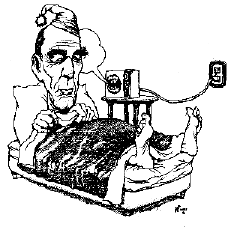
To: Lolitalark@yahoo.comSubject: A Radio/Television Theory of the American Mind

I sometimes wonder how to explain the typical American mindset. Some explanation is certainly in order.For example, after the financial collapse and recession of 2008-2009, the Americans were so outraged by the behavior of the big Wall Street investment banks that ... that they turned their House of Representatives over to the political party owned by the big Wall Street investment banks, the party which vigorously opposed even the modest regulation of investment banks embodied in the Dodd-Frank law.
Or, at the other end of the political spectrum, we have the noisy pop-Leftists (e.g., former Professor Ward Churchill & his admirers) who denounced as Nazis the civilians whose offense in 2001 was ... was flying in American civilian airliners, or working in a large skyscraper in lower Manhattan. The mindsets on display here seem peculiarly blind and deaf to elementary logical distinctions. The scientist Jared Diamond, for one observer, thought Americans were virtually disabled in this regard compared to the aborigines of New Guinea.
An explanation occurred to me early on the morning of September 11. I was listening to radio coverage of ceremonies commemorating the 9/11/01 casualties, mostly on NPR but briefly on a commercial station. The ceremonies were austere and dignified; and, on the commercial station, they were constantly interrupted by such things as blarney in promotion of a gambling casino, or chest-thumping plaudits for the brawniness of the Chevy pickup. The emotional dissonance between the tasteful ceremonies and these interspersed commercials was nothing short of surreal.
It occurred to me that Americans, who enjoy the most commercialized radio and TV in the western world, are subjected to this sort of thing for many hours a day from earliest childhood through adulthood. According to a 2010 study, American adults watch TV, on average, for 319 minutes and listen to radio for 91 minutes every day: that adds up to something like 100 mind-numbing transitions from content to advertisement and back every day. Come to think of it, maybe it is a wonder that they retain any ability at all to recognize a logical distinction when one comes up.
--- Jon Gallant